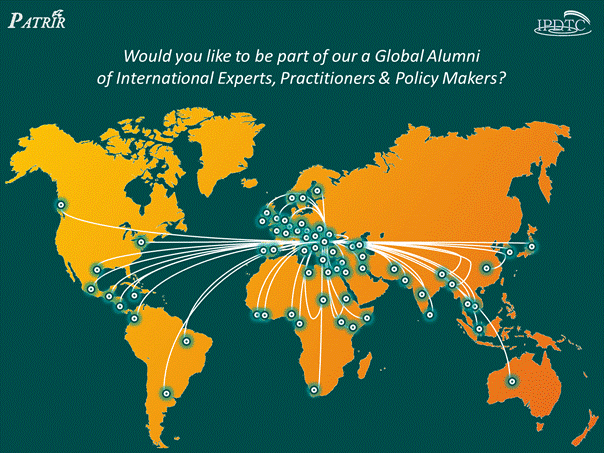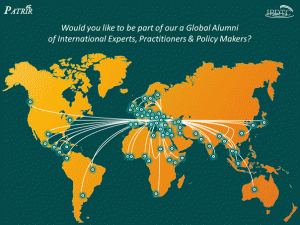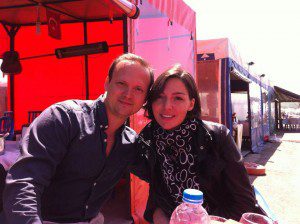In part 1 of 2, Guest Contributor Nilay Arkun interviews Kai Brand-Jacobsen, PATRIR’s Director of Peace Operations, about the inner workings of a peace institute and the larger field of peace work.
Kai, it’s a pleasure for me to interview you today, thank you for your time. As one of the co-founders and Director of the Department of Peace Operations at the Peace Action Training and Research Institute of Romania (PATRIR), can you tell me about PATRIR? Thank you, Nilay. I will be glad to. PATRIR is an institute which is dedicated to working for peace building and prevention of violent conflict, and working to seek how we can deal with conflicts more constructively. We are based in the city of Cluj-Napoca in Romania but we work all over the world – upon invitation and request. We are working in partnership with local organizations, national governments, parties to the conflicts, UN agencies and missions. The institute has 3 different departments. One is our National Department which works within Romania. We are involved in peace education programs in schools, in programs on multiculturalism and celebrating diversity. We deal with issues like working to overcome domestic violence and violence against women. And we also engage with our local authorities and the national government in the country to promote policies for peace building and conflict transformation. We then have the International Peace and Development Training Center, which is a dedicated center for training professionals working in peace building and conflict transformation. About 90% of our programs are done all over the world upon requests from UN agencies and missions, national governments, local and national organizations, and then 10% of the programs we offer are organized either as executive leadership programs in London for people with 15-20+ experience usually or as advanced trainings at the Global Academy in Romania. And then the third branch is the Department of Peace Operations that I work with. We are involved mainly in the mediation and support for peace processes. We do a lot of work with governments, agencies, and different types of organizations to help them improve what they are doing. So – how do you strengthen them and support the organizations working in the field to improve the quality, the impact, the effectiveness of what they are doing. And then we also work on policies – how can we help to bring forward policies and raise awareness on key issues that strengthen the field of peace building.
How did PATRIR get started? It was interesting actually. We were officially created on March 8, 2001, to celebrate International Women’s Day to show the commitment of the institute from the beginning to deal with gender issues. But it got started essentially from listening. We were travelling across the country, meeting with people of Romania, looking at what was happening. Everybody involved except myself was from Romania. And there was a feeling that there was a need to build up something from within the country that would address and work with the issues and the challenges facing people but do so in partnership, in solidarity, learning and working together with similar organizations and efforts in other countries.
Why Romania? For many reasons… It’s an incredibly beautiful country. And it’s the Peace Action Training and Research Institute of Romania. It was created by people from Romania. People sometimes say, “Why not London, why not New York, why not Oslo?” Because it’s an initiative of people from Romania that wanted to get involved in addressing conflicts and issues within the country and to see how they can support and work together with people around the world to reduce violence and to increase peace globally, and, very practically, to deal with specific conflicts. Also Romania, at the time the institute started, was the 2nd largest applicant country to the European Union, with a long history of international engagement in diplomacy in conflict issues, playing a back-channel role in several key negotiations. And we wanted to do something as Romanian citizens and someone who has fallen in love with the country. We wanted to do something to make people proud and to step up our responsibility for addressing issues that are facing our community and facing the world.
Can you give us some specific examples of projects and programs? Lots of exciting work is going on at the institute. We have a fantastic team there. One of the activities that I really like is actually part of our local programing. We have a Festival of Arts and Multiculturalism that we do every year. The city itself has 3 names actually — Cluj-Napoca is the Romanian one, Kolozsvar is the Hungarian name and Klausenburg is the German name. It’s a very multicultural city and there are challenges at times in terms of how the different cultures, religions and communities relate together, although for the most part, relations are very constructive now. But what we were trying to do is to take a step further and to look at celebrating our diversity as a source of richness. In another project, some of my colleagues carried out an incredible Peace and Development Education Program over the last few years called the Glocal Tour Project working with partners from other countries where they engage with students and schools all across the country to look at the Millennium Development Goals of UN, look at what they wanted, what was their experience with conflicts and violence, what type of communities do they want to build. And they travelled all across the country with these programs. Some of our engagements are in peace operations internationally. So we have been involved in Cyprus, Northern Ireland, Mexico, Sri Lanka, Nepal, Lebanon where we have been working authentically with partners and organizations in the countries to help support their efforts to address the situations there. And also the Training Center; it has got an incredible team. It’s committed to helping to improve the quality and professionalism in the field. We have trained now more than 4000 practitioners, scholars, experts, and senior leadership in the field worldwide from more than 70 different countries.
What is it that PATRIR brings to peace building? Actually it’s interesting because the institute was started by 3 volunteers with 2.5 broken computers and we accepted no external funding in the beginning. We built it up ourselves. The funding we had came from services that we did, such as our trainings. It has been built up over the years to the point in 2011 we were awarded the World Vision International Peace Prize based upon partners, colleagues, organizations, practitioners and people in the field all over the world writing in and supporting the institute to receive this. I was asked once by a German intern with us, “What is PATRIR?” and in that moment what came to me was the idea that it is the combination of passion plus professionalism dedicated to a purpose. What PATRIR does – that is done by some others but I think there is a unique character to it – is we systematically learn from, respect and bring together what’s being done by organizations all over the world. We learn from experiences and we apply perhaps more dedicated effort, not only to look at our own approaches, but to draw from the full breadth. Then what we do is we help to celebrate them, make it visible, we help to make sense of it, we bring together these different tools and try to understand what did these experiences from this situations and that situation, what we can learn from them in peace building and really trying to go in depth into understanding how it works. And then one of the things that we have been told, by thousands of people and by many dozens of partner organizations worldwide, is we help them to understand and make sense of these different peacebuilding tools. We bring a unique capacity to improve the quality and the professionalism of the field. We have a depth and breadth of experience, which is in many cases unique and then we work in partnership with organizations dealing with specific conflicts or with organizations trying to improve how they are working; where we really engage to understand the situation, the context, the needs they are facing in their culture and in their approach. And then, step by step, we help the system to build up capabilities. We put a lot of effort into looking at how to make prevention work, not simply saying “prevention is necessary”, not talking only about “we have to solve this”, but how do you actually do it. And the reality is: there is a huge amount of experience in the world today. It’s not that you can copy from one area to another but we can learn from it and we need to begin doing that much more systematically. Bringing real passion and dedication.
And to learn more about you how did you become involved in this field? I think it was a combination of different things over the years but sincerely the single most significant factor was that I was raised in an absolutely amazing family, with incredible parents and love. We also had the chance to travel, experience different countries, different cultures. And we grew up in an environment, in a family where there was political and social consciousness and where we learned about what was happening in the world around us. And then early on, from basically the age of 8, I was already studying and learning about different struggles and issues around the world and saw a movie “Cry Freedom”, which was very powerful. The first political act I did was to write a letter to the apartheid government calling for an end to apartheid. My high school education in Canada taught me about global issues and the idea that we had responsibility to be involved and the idea that Canada was a country that contributed to peace keeping. Then when I was 17, I had a chance to get involved in a project called Democracy, Human Rights and Peaceful Conflict Resolution, a 10-week training program, which was carried out in Norway. And that played a major role. At the end of that, I decided that this is what I was going to do and I have been involved working in the field since.
Is there anything else that you want to add and tell to us? I think one of the most important things is that we have reached a point in the world where we need to know that we can deal with conflicts more effectively. We have so much experience. A lot of what we are doing today is actually making the situation worse. We have this rabid investment and engagement with military responses. We have a policy spectrum being brought forth by senior leaders, government policy makers and others who simply need to take another look, need to study and learn and understand better the spectrum of how we deal with violence. Senior policy makers in many of the areas that I am involved in are essentially only receiving a spectrum of solutions and options which make the situation worse. There is an opportunity for us to learn from the incredible breadth of experience globally, from dealing with issues like preventing and addressing domestic violence, to conflict resolution and mediation at a global scale. And to gather those lessons and to get really professionally trained people, investing in peace building as a field, raising people’s awareness, responding to and recognizing that one of the largest demonstrations in the history of human existence took place on February 15th 2003, when people stood up and said “we do not want war,” with many millions of people all over the world. And in a way peace building is like other pioneering fields. We are at a major development stage of the field. And we will decide what happens, the choices we make and how we engage. Today there are literally tens of thousands of people all over the world that are working for peace building, many others dealing with environmental issues, human rights, and social justice. This is a time, this is a moment, for us to realize that our actions, our choices can make a difference. It’s up to us to do it. And there is a huge amount of experience that we can learn from.
Thank you very much for your time.
In Part 2, Kai will discuss PATRIR’s work in Cyprus with Vasilis Migos.





